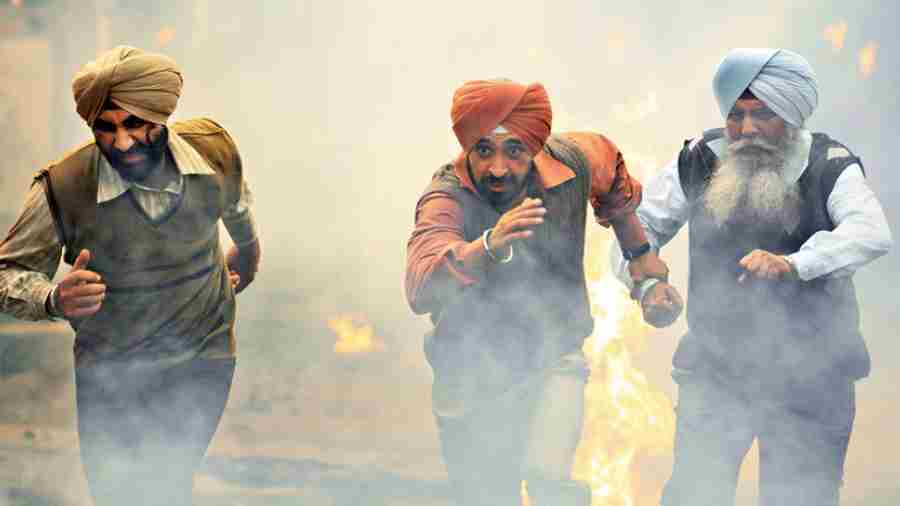One moment a Punjabi family, with trademark boisterousness, is sitting at the dining table digging into a shared breakfast of piping hot parathas, their infectious laughter rending the air of their cosy home. A few scenes later, one of them is burnt alive on the streets, in full public view, even as the rest of the family — and, like them, almost every member of the Sikh community — is forced to flee their homes.
Most of them lose their lives, hacked or burnt in the very neighbourhoods they grew up in, their lives ended by those they have known for years. The anti-Sikh riots of 1984, in which friends became foes overnight, is a dark, indelible blot in the history of the country.
In the aftermath of Prime Minister Indira Gandhi’s assassination by her Sikh bodyguards, a wave of violence — carried out systemically by the ruling administration, with the police as their lapdogs — was unleashed against the community, otherwise known as peace-loving and selfless.
What followed was stark horror, with those alive struggling to get out before it’s too late, their lives irrevocably changed forever. What happened in 1984 may have been specific, but the emotions are universal and its fallout still relevant. The secular fabric of the country was destroyed then, much like how it’s being destroyed now.
In that sense, Jogi, streaming on Netflix, is an important film for our times. Director Ali Abbas Zafar trains his lens on this fateful piece of history and tells his story through the eyes of his protagonist Jogi. Diljit Dosanjh, his eyes vacant through most of the film as he sees Jogi’s life and the lives of many others like him, falling apart in seconds, is the best man for the part.
The film is as much a slow-burn thriller — hundreds hiding in the backs of trucks under the cover of darkness and trying to cross the border brings on some nail-biting moments — as it is a dramatic representation of what happens when an entire community is hounded and held responsible for the act of a few. The narrative is grim, but the film strings together the elements of hope, courage, love and friendship. Even as Jogi pulls out all the stops to save his family, and eventually all of his people, he is aided by his childhood friends, a cop played by Mohd Zeeshan Ayyub and a businessman played by Paresh Pahuja.
The film, in this case, falls prey to the cliche of having one of them as a Hindu and the other a Muslim. It’s a worn-out 1970s-old Bollywood trope that Jogi could have done without. Jogi aims straight for the tear ducts, especially in the scenes where the protagonist has to let go of the symbols of his religious identity in order to blend in the crowd. For all those familiar with how integral the turban and kada are to the identity of a Sikh, this is a poignant moment handled sensitively and not milked unnecessarily for sensationalism.
What Jogi suffers from, however, is a stretched-out plot, with the scenes involving Kumud Mishra’s slimy political player looking to score with the vote bank by baying for the blood of Sikhs, remaining unidimensional. Mishra has the innate ability to lift characters off paper and imbuing them with flesh and blood. Here, his scenes are repetitive and his menace predictable.
Also, feeling a tad disjointed is Jogi’s doomed love story (Amyra Dastur, making no impact, flits in and out in the blink of an eye), that only serves to highlight the subsequent track of a childhood buddy (played by Hiten Tejwani sporting a perpetual frown) who joins the bloodthirsty mob. Jogi suffers from sluggishness in parts, but coming to its aid is a sterling central act from Diljit Dosanjh. Diljit inhabits Jogi like second skin, with real spilling into reel, particularly striking a chord in the scenes where he has to portray the emotional toll of giving up a life and identity integral to his being. It’s a performance that stays on with you.
However, the script isn’t watertight and doesn’t always follow logic. The makers’ argument can be that the loose plot mirrors the chaotic circumstances that Jogi and his people find themselves in, but even then there are some things (we won’t spoil it for you) that make little sense. In the end, Jogi becomes the epitome of sacrifice, with the film ending on a note of how hope and humanity should prevail against all odds.
While in Mumbai recently to interview Ali Abbas Zafar for Jogi, I met a fellow journalist, in his mid-40s, who didn’t even know that 1984 had happened. For him, and for many others, Jogi is an important and necessary story to tell.











